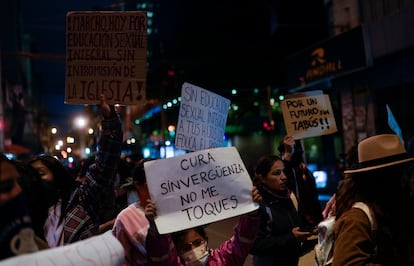Victims who were sexually abused in Bolivia’s Jesuit schools make their voices heard: ‘We don’t matter to the politicians’
The alumni association of the Juan XXIII school in Cochabamba, the epicenter of the Company’s pedophilia scandal, attacks the Truth Commission presented by the Government. ‘It is only made up of public officials’


In 2018, EL PAÍS launched an investigation into pedophilia in the Catholic Church. We maintain an updated database with all known cases in the Hispanic world. If you know of a case that has not been reported on, you can write to us at: abusos@elpais.es. If your information is regarding a case in Latin America, the address is: abusosamerica@elpais.es.
─────────
Victims of pedophilia in Jesuit schools across Bolivia have been making their voices heard, criticizing the fact that the government hasn’t bothered to consult them about a law that seeks to eliminate the statute of limitations for crimes of pedophilia, nor about the creation of a truth commission to investigate specific cases and prepare a report.
“The politicians don’t care about us. They don’t care about the victims. They want to approve a truth commission that they’ve designed without the advice of specialists in the field or victims’ associations. It’s only made up of political appointees… they want to quickly approve the bill to put this issue to rest,” says Edwin Alvarado, spokesman for the alumni association of the Juan XXIII school in Cochabamba, the epicenter of the child abuse scandal that has engulfed the Society of Jesus in the Andean country.
Many of those affected are also surprised that the bill – presented a few weeks ago by President Luis Arce – proposes the elimination of the crime of statuatory rape. Under current Bolivian law, this is when an adult engages in sexual relations with a minor between the ages of 14 and 16 through seduction or deceit. “We don’t understand it. The objective is supposed to stop impunity for abuses – rape is one of them. It seems that many politicians can benefit by getting rid of these crimes,” Alvarado affirms.
The Latin American country has seen how, in less than a month, pedophilia within the Catholic Church has become one of the most pressing issues. The publication of the secret diary of the Spanish Jesuit priest Alfonso Pedrajas – where he admitted that he abused dozens of children in Bolivian schools and that his superiors covered it all up – has shaken the entire Catholic Church of Bolivia. First, the religious authorities forced the Society of Jesus (the Jesuits) – an institution that has quietly removed eight high-ranking officials for orchestrating the cover-up – to answer for the mismanagement of decades-worth of abuses and stop the media earthquake.
However, the public has not been pacified: even more cases have since come to light, while indignation has taken hold in the streets. In recent weeks, small protests have been held in the country’s largest cities, with demonstrators gathering outside the doors of seminaries, churches and other ecclesiastical organizations. They are repudiating the inadequate response of religious hierarchies towards pedophilia. In cities such as Santa Cruz, Sucre, Cochabamba or La Paz, placards call for justice and more protection for minors.
The problem is now part of the government’s political agenda. The Prosecutor’s Office opened an investigation and the Bolivian president – in just a week-and-a-half – already had a draft of a law ready to go that would provide victims with “the right to clarify the truth” and receive monetary reparations. But many of the victims feel that the content of this bill has not been properly discussed. Without the input of experts, they’re afraid that a rushed passage of this law will only favor the aggressors and those who helped cover up their crimes. For this reason, the organized group of victims has prepared a text – which EL PAÍS has been granted access to – that contains a dozen proposals to modify several of the proposed law’s points. The group plans to present this text before the Plurinational Legislative Assembly, in La Paz, the country’s seat of government.
The main claim of the victims’ association is that the composition of the truth commission be reformulated. Under the current proposal, the members – all government workers – would be political appointees. The victims are demanding that this commision also include “representatives of the organizations that bring together the victims of clerical sexual crimes,” entities dedicated to the protection of human rights, as well as at least two independent specialists – one man and one woman – elected by two-thirds of the parliament. The document highlights that no member of the executive branch, any ministry or the Ombudsman’s office should be part of the commission, “so as to avoid the politicization of such a sensitive issue.”
Along the same lines, the association proposes that the commission’s members come from a variety of political parties – including those from opposition and minor parties – to ensure that the investigative body is not held “captive” by the ruling party. The association also emphasizes that under no circumstances can religious institutions to which the aggressors and concealers have belonged participate in this initiative.
Ending Clergy Abuse (ECA) – a global organization advocating for the victims of pedophilia in the Church, present in 17 countries on five continents – has also spoken about the commission proposed by the government. ECA notes that this proposal “is not consistent with internationally-recognized standards for the formation of truth commissions, such as those that have already [been set up] in countries such as Ireland.” In a statement made just days after President Arce offered up the proposed initiatives, ECA demanded “the necessary and indispensable inclusion of the work of victims and human rights organizations” in order to “guarantee justice in an independent and impartial manner.”
The international organization also has expressed concern about an interview given by Minister of Justice Iván Lima, who the government has proposed be part of the truth commission. Without referencing any specific studies, he said that, between 1950 and 2021, 99.7% of priests have not sexually abused minors.
“[This] makes it possible to notice, worryingly, an unobjective take on the situation that the victims are currently experiencing,” ECA warns. Regarding the case of Pedrajas, Lima maintains that the number of victims that Pedrajas himself admitted to sexually assaulting in his diary (about 85) “seems excessive.” ECA believes that these statements – in addition to re-victimizing those affected – “question the impartiality of the truth commission and cause the highly commendable effort of the Bolivian government to lose legitimacy.”
On other points of the bill, the alumni association believes that the new law should include “abuse of power or conscience” as an aggravating circumstance. They propose to increase the prison sentence for those who help cover up the sexual assault of adults to “a minimum of four to six years.” And, in the cases of those who cover up crimes of pedophilia, they want the minimum sentences to be between seven and 10 years.
“A paragraph should be included that states: ‘When [the individual who conceals the acts] is the legal representative or highest authority of an entity whose members committed sexual crimes against infants, girls, boys and adolescents, institutional responsibility is established in the commission of this crime,’” the text notes.
The alumni association also insists that the new law must confirm “that no religious institution is above national laws, especially considering that the Concordat of 1851 (an agreement between the Spanish Queen Isabella II and the Vatican) is not endorsed by any law in Bolivia and is, therefore, invalid.”
Rejection of the Vatican’s investigation
Many of the victims have not welcomed the visit to Bolivia by the Spanish priest Jordi Bertomeu – a close friend of Pope Francis and one of the leading experts on abuses within the Church. Bertomeu has participated in numerous anti-abuse missions in Latin America, such as the investigation of Father Maciel in the Legionaries of Christ in Mexico, as well as the pedophilia scandal in the Catholic Church of Chile, which ended with the dismissal of practically the entire ecclesial leadership in the South American country.
“Victims and survivors of clerical pedophilia in Chile have publicly denounced that, in 2018, a papal commission made up of Bishop Charles Sicluna and Jordi Bertumeu was merely a mechanism for re-victimization and impunity. Due to this precedent, we [wish to alert the public] that the arrival of Jordi Bertomeu to Bolivia has the intention of repeating the Chilean case, without results and with greater re-victimization,” the Juan XXIII alumni association announced this past Tuesday in a statement.
Those affected say that they are “concerned that an institution (the Catholic Church) that is being investigated for [committing crimes and being complicit in a cover-up] meet with the victims.” They are demanding that the Bolivian authorities change their position to prevent the “violation of constitutional sovereignty in the face of the possibility of installing ecclesial jurisdictions, which will only re-victimize the abused and seek to maintain impunity and the cover-up of sexual crimes by Catholic clerics.”
Sign up for our weekly newsletter to get more English-language news coverage from EL PAÍS USA Edition
Tu suscripción se está usando en otro dispositivo
¿Quieres añadir otro usuario a tu suscripción?
Si continúas leyendo en este dispositivo, no se podrá leer en el otro.
FlechaTu suscripción se está usando en otro dispositivo y solo puedes acceder a EL PAÍS desde un dispositivo a la vez.
Si quieres compartir tu cuenta, cambia tu suscripción a la modalidad Premium, así podrás añadir otro usuario. Cada uno accederá con su propia cuenta de email, lo que os permitirá personalizar vuestra experiencia en EL PAÍS.
¿Tienes una suscripción de empresa? Accede aquí para contratar más cuentas.
En el caso de no saber quién está usando tu cuenta, te recomendamos cambiar tu contraseña aquí.
Si decides continuar compartiendo tu cuenta, este mensaje se mostrará en tu dispositivo y en el de la otra persona que está usando tu cuenta de forma indefinida, afectando a tu experiencia de lectura. Puedes consultar aquí los términos y condiciones de la suscripción digital.








































